7 Habits of Highly Effective
The 7 Habits of Highly Effective People

﹡受成长历程,社会环境及个人观念的影响。
15 / GE /
思维模式转换
Paradigm Shift
如果我们想要有重大的改变,我们必须先改变 我们的思维方式。 《科学革命的构架》(The Structure of Scientific Revolutions)一书的作者汤姆斯.肯 指出:每一项科学研究的重大突破几乎都是先 打破传统打破旧观念,然后取得成功的。
我们的家庭使命
创造一个充满爱与和谐轻松愉快修 身养性的氛围。 提供每一个家庭成员既独立承担责 任又互相依赖的机会,从而使人生 更有意义。
36 / GE /
我的信条
我视每一日为新的开始,因此我有更多机会书写人生新的篇章。我从宝贵 的生活经历中学习得到成长。我把握每一个机会, 不畏艰难,不怕失败。勇于承担责任。
在信任之上的。
• 信任只给值得被信任 的人
个人 可信度
11 / GE /
品格与能力
Character and Competence
品格:品格良好的人具有正直、 成熟以及富足的心态。 能力:能力强的人具有专业知识 与技能。
信任度 Trustworthines s
信任
Trust
品格
Character
能力
习惯 持续成熟模式 原则 思维 产能/产出平衡效能的原则
习惯的培养
知识是做什么以及为何去做; 技能是如何去做; 意愿是想要去做。
习惯 技巧 ( 如何做 ) 意愿 ( 想做 ) 知识 ( 做什么, 为何做 )
要养成良好的习惯,我们必须具备以上三点。
6/ GE /
习惯的特点
• 长期形成
• 自然流畅 • 不思而为
我是个负责的丈夫(妻子)和父(母)亲,我很重视这两个角色。我努力 同家人朋友商业伙伴建立良好的双赢关系。我每日在他人的情感帐户内存 款,以保持良好人际关系并建立高度信任。
高效能人士的7个习惯

Interdependence is the paradigm of we, we can do it, we can cooperate, we can combine our talents and abilities and create something greater together.—Achieve success by group efforts.
习惯一:积极主动
Habit 1: Be Proactive
Our basic nature is to act, and not to be acted upon. As well as enabling us to choose our response to particular circumstances, this empowers us to create circumstances.
习惯一 积极主动
Habit 1: Be Proactive
• 积极主动的人有责任感,不把自己的行为归咎于环境或者他 人.
Highly proactive people recognize their responsibility. They do not blame circumstance, conditions, or other people.
The 7 habits paradigm
三个不同的期间
The Maturity Continuum
• 依赖期:围绕“你”这个观念,你照顾我,你为我的成败得失负责; 事情若有差错,我便怪罪于你。--靠别人来完成自己的愿望。
Dependence: Paradigm of you, you take care of me; you come through for me; you did not come through, I blame you for the results.—Depend on others to achieve wishes.
The 7 Habits of Highly Effective People精品文档19页
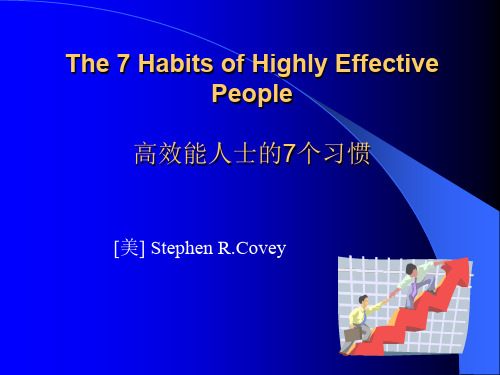
习惯5: 知彼解己(Seek First To Understand, Then To Be Understood)
同理心倾听 站在对方的角度 有效的沟通 适时扮演知音 表达也要讲技巧
主动积极
采取主动:不要找借口 化消极为积极 不要说“我办不到” 行动胜过“感觉” 别让问题制服了你 用心扩大影响圈 先从自己做起 不怕犯错,只怕不改过 作出承诺,信守诺言
习惯2: 以终为始 (Begin With The End In Mind)
确认使命:着手做任何一件事前,先认清方向.
习惯3: 要事第一(Put First Things First)
轻重缓急体系 别让琐务牵着鼻子走 勇于说“不” 有效授权
个人管理方法六标准
一致:理想与使命,角色与目标,工作重点与计 划,欲望与自制
平衡:健康,家庭,个人发展等的平衡 有重心:做第二象限的事情 重人性:考虑人际关系的得失 能变通:可调整 携带方便:随时可供参考修正
互赖期:从“我们”的观念出发—我们可以自主, 合作,共创前程.
效能(Effectiveness)
产出与产能必须平衡(P/PCBalance) 产出:是你希望获得的结果 产能:是你借以达到目标的资产或本领
习惯1:主动积极(Be Proactive)
采取主动 人必须为自己负责 个人行为取决于自身,而非外在环境 理智可以战胜感情
习惯6: 统和综效(Synergize)
敞开胸怀,博采众长 开辟变通方案 尊重差异 化阻力为助力 重视个人参与
沟通的层次
自我防卫:损人己或损己利人 彼此尊重:妥协 统合综效:利人利己
高效能人士的七个习惯

– 技能
• 如何去做
– 意愿
• 意愿是想要去做
技能
意愿
• 养成习惯
– 若要在生活中养成习惯,以 上三种缺一不可
(怎么做)
(想要去做)
10
THE 7 HABITS OF HIGHLY EFFECTIVE PEOPLE
思维引发行为; 行为渐成习惯; 习惯塑造品格; 品格决定命运。
习惯的养成
知识 Knowledge
习惯的意义
人的行为总是一再重复,因此卓越 不是单一的举动,而是习惯。 ——亚里斯多德
13
THE 7 HABITS OF HIGHLY EFFECTIVE PEOPLE
持续成熟的模式 -- 成熟的三个阶段
• 依赖期:围绕着“你”这个观念。 ——你照顾我;你为我的成败得 失负责;事情若有差错, 我便怪 罪于你。 • 独立期:着眼于“我”的观念。 ——我可以自立;我为自己负责; 我可以自由选择。 • 互赖期:从“我们” 的观念出发。 ——我们可以自主、合作、统合 综效, 共创伟大前程。
• 需要工作→被工作需要
26
THE 7 HABITS OF HIGHLY EFFECTIVE PEOPLE
情感帐户EBA • Emotional Bank Account
• 情感帐户是比喻情感关系中的信任程度, 因为人与人的每一次交往都可以被看作是
存款或提款。
• 存款能建立、维护或加强关系中的信任
思维转换
• 建立全新的观点
• 我们每个人都守着一扇自内开启的“改变之门” • 除了自己,没有人能为你开门 • 只要你愿意敞开心灵 • 抛却原有思维 • 把良好的原则化为习惯 • 成功的圆满就在掌握之中
22
THE 7 HABITS OF HIGHLY EFFECTIVE PEOPLE
7_Habits_of_Highly_Effective_People_高效人士的7个习惯
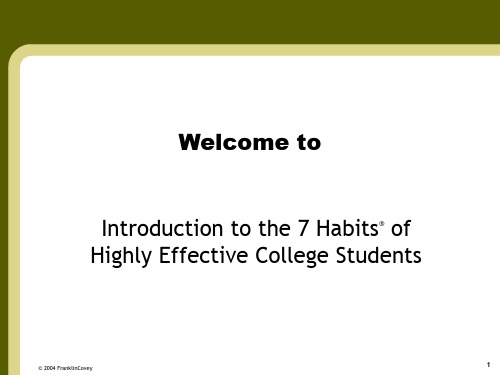
© 2004 FranklinCovey
5
Habit 1: See-Do-Get
I am responsible for my choices.
See
I am in control.
Get
© 2004 FranklinCovey
Do
I choose to act,
not react.
6
Key Questions
• Go on a date with a friend.
• Work on an essay due in 30 days.
• Call home.
• Visit with academic advisor.
• Engage in idle conversations.
• Respond to all instant messages.
Welcome to
Introduction to the 7 Habits® of Highly Effective College Students
© 2004 FranklinCovey
1
Knowledge, Skill, Desire
© 2004 FranklinCovey
2
See-Do-Get See
• Respond to all phone calls.
• Spend time on trivial questions.
• Engage in too much TV, Web surfing or video games.
• Engage in timewasters.
• Become absorbed in escape activities.
高效能人士的七个习惯(英文)
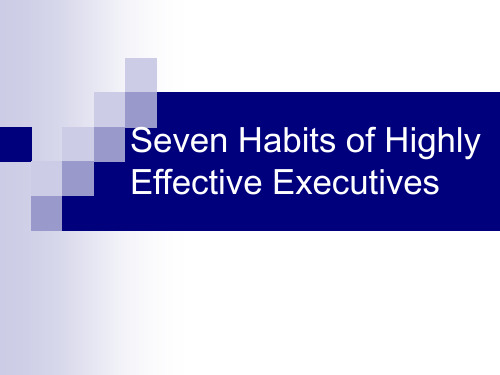
Work
Be an “actor” not a “reactor” Focus on your circle of control
Begin with the End in Mind
Self
All things are created twice, first in our mind then in actuality
Synergize
The whole is greater than the sum of the parts
Value the differences Share the goals, share the wealth Look for ways to partner
Sharpen the Saw
You can create your own self first in your mind, then with a plan in actuality
Develop your own personal mission statement
Work
Decide where you need to be first, then put together the action plan
Don’t be too busy sawing that you can never sharpen the saw
Take time for self-renewal
Physical self-renewal Spiritual self-renewal Mental/Intellectual self-renewal Social/emotional self-renewal
Seven Habits of Highly Effective Executives
7_Habits_of_Highly_Effective_People_高效人士的7个习惯
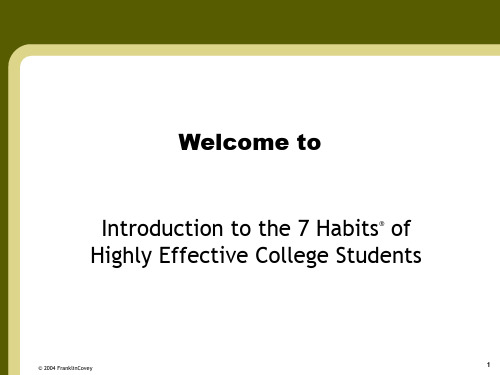
▪ Desire success for others.
▪ Have a strong self-image.
▪ Enjoy the rewards of hard work.
▪ Make sure their words and actions show respect
for all team members.
13
Habit 2
© 2004 FranklinCovey
Habit 2
Begin With the End in Mind®
14
Habit 2: See-Do-Get
I visualize results.
See
I live according to my Get mission.
© 2004 FranklinCovey
• Respond to all phone calls.
• Spend time on trivial questions.
• Engage in too much TV, Web surfing or video games.
• Engage in timewasters.
• Become absorbed in escape activities.
18
Habit 3: See-Do-Get
I focus on what’s
See
important.
I achieve my goals.
Get
© 2004 FranklinCovey
Do
I plan my time according to my priorities.
19
Life Management Quadrants
高效能人士的七个习惯
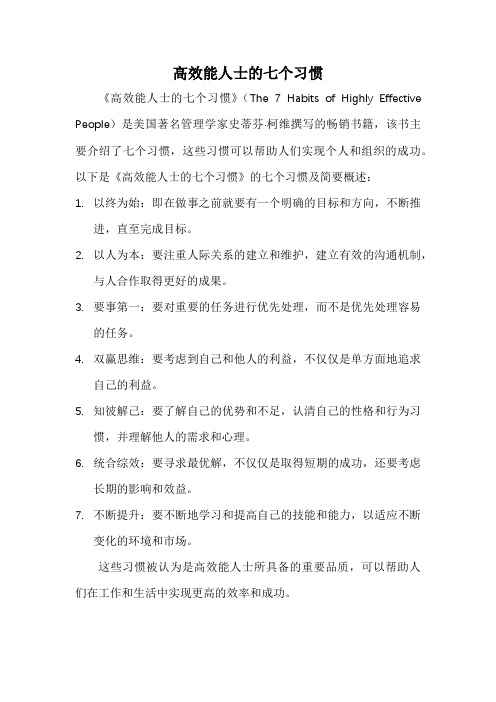
高效能人士的七个习惯
《高效能人士的七个习惯》(The 7 Habits of Highly Effective People)是美国著名管理学家史蒂芬·柯维撰写的畅销书籍,该书主要介绍了七个习惯,这些习惯可以帮助人们实现个人和组织的成功。
以下是《高效能人士的七个习惯》的七个习惯及简要概述:
1.以终为始:即在做事之前就要有一个明确的目标和方向,不断推
进,直至完成目标。
2.以人为本:要注重人际关系的建立和维护,建立有效的沟通机制,
与人合作取得更好的成果。
3.要事第一:要对重要的任务进行优先处理,而不是优先处理容易
的任务。
4.双赢思维:要考虑到自己和他人的利益,不仅仅是单方面地追求
自己的利益。
5.知彼解己:要了解自己的优势和不足,认清自己的性格和行为习
惯,并理解他人的需求和心理。
6.统合综效:要寻求最优解,不仅仅是取得短期的成功,还要考虑
长期的影响和效益。
7.不断提升:要不断地学习和提高自己的技能和能力,以适应不断
变化的环境和市场。
这些习惯被认为是高效能人士所具备的重要品质,可以帮助人们在工作和生活中实现更高的效率和成功。
- 1、下载文档前请自行甄别文档内容的完整性,平台不提供额外的编辑、内容补充、找答案等附加服务。
- 2、"仅部分预览"的文档,不可在线预览部分如存在完整性等问题,可反馈申请退款(可完整预览的文档不适用该条件!)。
- 3、如文档侵犯您的权益,请联系客服反馈,我们会尽快为您处理(人工客服工作时间:9:00-18:30)。
7 Habits of Highly Effective“Welcome to this <<Seven Habits of Highly Effective Peopl e>> of Dr. Stephen R. Covey. In this audio program, Stephen shows that the effective of ourselves and with others is bas ed on our individual character and not on quick-fix formulas or manipulate techniques. He also teaches us that we are not sol ely the product of our conditions or operating or ge netic makeup,but the essential elements in l ong-term effectiveness, our habits, can be l earned and d eep ly internalized. Stephen begins by id entifying specific exampl es of results you can expect from living and applying the seven habits and shares how to get most out of this progra m. ”Question 1:What d etermines our influence power? Stephen Covey:Individual character【1】Quick-fix formulas【0】Manipulate techniques【0】NYY:Trust:short-term effect (equal to Stephen C.’s“individual character” factor) Techniques: l ong-term effectQuestion 2:What d etermines who we are? Stephen Covey:ConditionsOperating or Genetic makeupHabitsNYY:Level 1: Interaction between genetic makeup and environment (Eric Kand el’s work) Level 2: Interaction between memory network and environment (Learning and Memory) How d o we respond and behavior to the worl d?Refl ex(反射) Involuntary stimulus controlRespond(反应) Voluntary stimulus control (Habit)Behavior(行为) Internally initiated behavior (Habit)Action(行动) Thought initiated behaviorWe have behavior science including the first three, not the last most important one. Action chain: goal, plan, behaviorWhat determines our fate?Genetic makeupEnvironment mapHow d o we move?《— Personal character;Any moment is a new starting point. How d o we change our fate?Change the environmentChange ourselves/myselfWhat can we change?Value systemGoal settingPlan, lad d erExecutionHow can we change? Know, apply, and teach“I will representing seven interrelated habits that high effective peopl e having internalize d, habits that are part of their very nature. I woul d to give you an id ea what you can expec t, and also what you shoul d to meet these expectations. This is a life changing program. I am not using hyperply, I am not trying to exaggerating for the effects. There is absolute g uarantee if you will understand these habits, teach them to other peopl e, and l earn them well, and then apply, live them unstill they become part of your nature, it will change you r life in a very fundamental way, for good in these areas:“One, improved self-confid ence, self-esteem. That will come largely out of a sense of bett er self-control. Your are not victimized, your are not been controll ed by circumstances, yo u are in control.”Self-confid ence is obtained by the experience of being success.“Two, improve the relationships. Many peopl e have relationships that are d eteriorating, t hey are broken or they are breaking. It maybe with their l oved ones at home, it maybe i n their businesses. To significantly improve the quality of our relationships is one of themajor expectations. You can expect it. It will happen.”Relationship is d etermined by how d o you react,mentally and behaviorally, to the world. The worl d will respond to you in the way you respond to them.Change yourself is easier than changing the word.“Those first two expectations are very related to each other. The higher your self-confid e nce is, the more you will respect others, and work well with them, the l ess their weaknes ses will be empowered by your d epending upon them, relating to these weaknesses. Nev er buil d your emotional life on the weakness of other peopl e, by d oing so, you empower t heir weakness to control you, you magnify them, your strengthen them, you enlarge the m.”You can swim in either the sweet sea or bitter sea.Third, the capacity to influence others will be significantly enhanced. To motivated other s. How d o you like to see your kids d o their jobs cheerfully without been remind ed. How d o you like to see your employees, or other of your working associates, willing send your needs, respond to it, cooperate, creatively solve problem.The power of making the worl d the way you like.The forth areas of expectation, is the spirit of adventure and creativity, enjoy and zest, ex citement and happiness. The spirit of seizing new opportunities, d oing new things, of gr owth, of l earning, these things are very very exciting. “The venture of changing yourself and changing the worl d.These are the four basic areas I think you can expect dramatic, even in some cases, revol utionary results. This is not a quick-fix program. It is not based upon some technique, or some instinct revolution. It's an evolution; you have to pay the price.The price basically involves these things: work very diligently to und erstand, l earn, in oth er words. Work with your mind to think d eeply in sustained ways about this material. T wo, teach it to other peopl e. Shortly after you learn this material, teach it. By shortly I m ean within 24 to 48 hours. Your simply will l earn better when you teach. All of us have t hat experience. Because your whol e sense of responsibility is significantly increased. Yo u know that you are expected to teach someone else to another group the same material you are l earning. It will give you a sense of commitment to the material, simply becauseyou are making a statement when you teach this material. It socially commits you. That is powerfully reinforcing to your own motivation to live the material, to live the principl e s, to cultivate the habits.I encourage a commitment to teach, and think right now who are you going to teach and when. Put it on your calendar; put it in your schedul e. Literally plan to teach it. I woul d e ncourage two times. Once to your l oved ones, and once to your working associates. To o thers you know who woul d have interests, and you like to share this material with, you c are about, peopl e you like. But the most important activity, of course, is the d oing, the ap plying, the living. Whenever we are enlightening about the correct principl e, it is coming upon us to live it. That is the only bases on which we can receive further und erstanding of other principl es, higher principl es. That is a test of our integrity. Integrity basically is the value we place upon ourselves. That's a test of our self-discipline.So those are the three basic activities: l earning, teaching, d oing or live, applying the mate rial. If you d o those three things, these materials will become part of the way you think. To use the computer metaphor, they will become the part of the software of your head. A nd little by little, you will find the material will become more and more yours, d eeply inte rnalized and will effect all those other areas I identified upfront, that you will expect to h ave significant even dramatic kinds of improvements in, self respects, self confid ents, imp roved relationship with others, improved capacity to motivate to influence, and a whol e n ew l evel of zest, excitement, adventure, and joy, and happiness, and creativity in your life.【Levels of processing】To see and to hearTo knowTo und erstandTo useTo teach[GPA System-Behavior Mod el] System Behavior Chain: Goal ->Plan->Execution (GPA) Goal:Value system: d etermine what is important and urgent, all ocate your resource accordingly.The thing seizes your attention is becoming a goal.Life if composed goals.Goal structures.Desires: Maslow triangl eLife Object and its mil estonesMost of us are a mix of all abovePowerful structure: Cl ear objects and mil estones and suppressed d esires Power of powerful structure: synch all your resource and actions Plan:Resource preparingObjects: Peopl eComputing power:MoneyAlgorithm: Method and toolData:MaterialsLevel of Planning: By l evels of uncertaintyExecutabl e plan: l evels of efficiencyProgramming efficiencyEfficiency of planImpact on things and impact on peopl eAttention and Memory effectsAttention managementMemory managementLearning managementThinking managementLife managementSemi-executabl e plan:Bootstrapping plan: (摸石头过河)Do the best, l eave others to the processResearch before planningMental d ebuggingAction:Power of thinking and actionImportance of Action: The impact of thoughts are realized by actions Goal oriented action: actions not l ead to goal is meaningl ess Feedback, adjustment and l earning【Our Impact on the Worl d】Short effectMid dl e effectLong-term effect【Sacrifice short-term for the l ong-term】Physical creation foll ows the mental creationsDon’t tie yourself to your history; tie yourself to your potential.。
